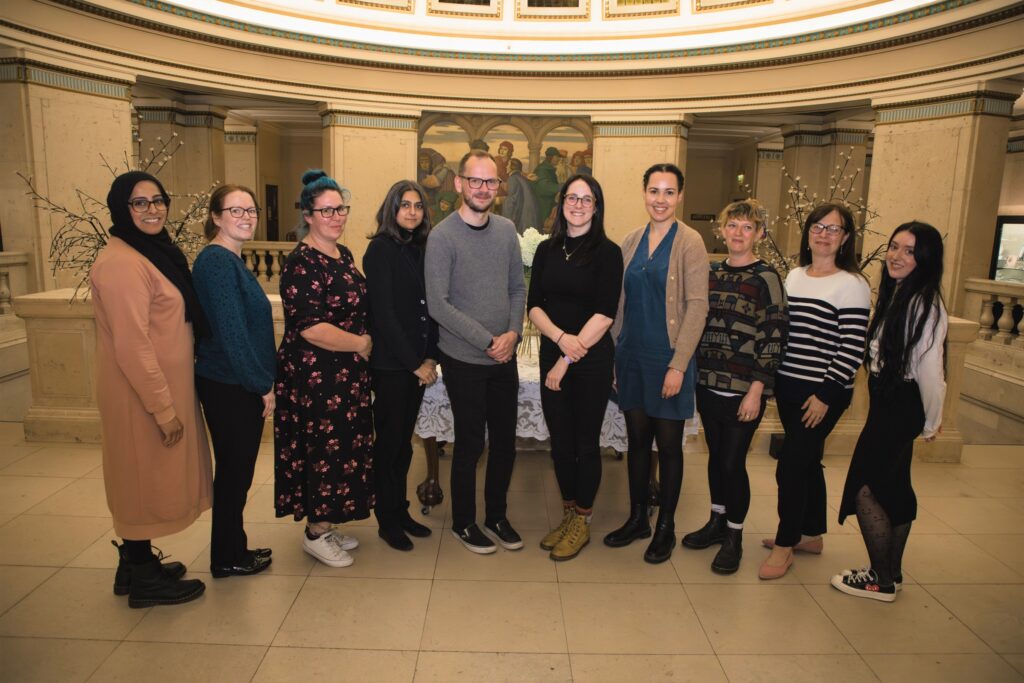Wednesday 17 May 2023
Co(l)laboratory launches its first cohort of research projects aiming to to create meaningful change for Nottinghamshire’s communities
Nottingham Trent University and the University of Nottingham have recently welcomed 10 students as part of the Co(l)laboratory program. These students will embark on full-time and part-time community-led PhD research projects to improve communities’ lives across Nottingham and Nottinghamshire. The Co(l)laboratory initiative is an ambitious eight-year project that seeks to unite academia and the community to drive positive change, enhance well-being, and foster growth and development within local communities.
Competitive Selection and Enrolled Research
After a rigorous, specially designed, competency-based selection process, candidates were chosen based on their community experience, potential for success in research, and commitment to making a positive impact in the community. These individuals have been enrolled in a fully funded Doctoral Training Programme, which will span 3 years (full-time) and 6 years (part-time), resulting in the award of a PhD qualification.
The development of the PhD projects was a collaborative effort between academic researchers and local, community-focused organisations such as Skate Nottingham, Nottingham Violence Reduction Unit, Nottingham City Council, Nottinghamshire Integrated Care Board, and The Pythian Club, among others. 17 PhD projects were developed based on the needs and priorities of the citizens of Nottingham and Nottinghamshire, with 10 ultimately chosen for funding.

Exploring Key Local Challenges
Co(l)laboratory’s first 10 projects tackle a wide range of challenges relevant to the local community, including;
- How has COVID changed public participation in health and well-being activities in Nottingham?
- What barriers do young people in Nottinghamshire’s former coalfields area face as they transition from education to employment?
- How can understanding the lived experience of workplace coercion, exploitation, and modern slavery in the community across Nottingham improve labour market policy and strategy?
- How can boxing club programmes be used to reduce violence and address community needs in Nottingham?
- How can a better understanding of risk and resilience among local people vulnerable to suicide enhance the delivery of local suicide prevention services?
- What are primary school-aged children’s experiences of participating in the UNICEF Child Friendly Nottingham initiative, and how can we better understand and support underrepresented children in our city.
- How can healthcare bodies like the Nottingham and Nottinghamshire NHS Integrated Care Board use democratic strategies to give the Nottinghamshire public more of a say in the planning of public health services.
- Exploring ways to improve the personal, social and healthcare consequences of Black and brown skin maternity service users in Nottingham and Nottinghamshire.
- How can future mixed-use public spaces like Nottingham’s new skateboard-friendly station bridge are be made to be more inclusive spaces for more young people, and support opportunities alternative education and enrichment.
- How can Nottingham communities use their lived experience to help inform responsible data analytics and other community-led approaches to reducing serious violence amongst young people.
Explore all of our PhD research projects in full detail here
Community Engagement and Optimism
To mark the start of our first PhD students, an induction and launch event was held on April 27, 2023, at the Nottingham Council House; the civic heart of the city. The first half of the day was facilitated by our project partners from the National Coordinating Centre for Public Engagement, who worked with our research teams on tasks around setting common goals and values to underpin the work which lies ahead. The afternoon then saw the arrival of a range of guests from local community organisations who had the opportunity to meet our research project teams and to hear directly from our PhD students about the research they would be undertaking and it’s relevance to different communities.
The event garnered significant support from community guests and distinguished individuals, including Mel Barret, Chief Executive Officer for Nottingham City Council, Jeremy Gregory, Pro-Vice-Chancellor for the Faculty of Arts at the University of Nottingham, and Richard Emes, Pro-Vice-Chancellor for Research and Innovation at Nottingham Trent University. Their generous endorsement of the project teams and excitement for the potential developments added to the celebratory atmosphere of the occasion, as academics and community partners came together to forge a collaborative working relationship.
